- Free shipping from 220€The order of accessories (without BikeTrax) is excluded from the free shipping costs.
Flotten-Special, PowUnity explains, Top, Topics
GPS fleet tracking – the intelligence for smart e-mobility
Inhalt
GPS fleet management in a nutshell
- E-bike fleets are becoming increasingly important, especially in cities. A well-known example is the European market leader nextbike.
- Because e-bikes have electricity on board, they allow for the easy integration of data loggers and GPS trackers. Networking by means of fleet management software allows digital fleet management. If the GPS tracker can also be connected to the CAN bus of the e-bike, data such as the battery status can also be transmitted.
- For providers, digital fleet management brings many advantages: they can make their processes more efficient, prevent theft, reduce costs and carry out maintenance in good time.
- The PowUnity fleet management platform be integrated into their own systems via an API. Users receive a wealth of data, for example on position, kilometers travelled, start and end times of journeys and speed. In addition, the GPS tracker BikeTrax ensures that stolen e-bikes are quickly recovered through seamless tracking in real time.
What is gps fleet tracking?
Fleet tracking management refers to the administration, planning, full control and monitoring of vehicle activity of several vehicles. The main focus is on the distance travelled by a vehicle, e.g. a truck, car, bus or bicycle, while certain influencing parameter are taken into account. A fleet tracking management system supports the coordination, evaluation and optimisation of vehicles and their routes. In other words: GPS fleet management should help to use all the resources and services of a vehicle fleet in the best possible way, to identify and rectify maintenance at an early stage or to avoid problems.
Special case: Bicycle and e-bike fleets
Company, municipal or tourist bicycle fleets have long been part of the urban picture. Probably the best-known urban fleet operator is the European market leader “nextbike”. Nextbike offers rental bikes through various partners in over 60 cities and 25 countries. Depending on the city, lending and return as well as the fleet tracking system behind it work mainly “analogue” or via fixed stations.
With e-bike fleets, the rental concept is digitally possible, because electricity on the bike means that digital components such as GPS trackers or data loggers can be easily integrated on the bike. The first step towards the “connected e-bike” has thus been taken. E-bike sharing and rental providers can then use this hardware and “digital” gps fleet tacking software to monitor their e-bikes in their software application. With the right technology and software, it is not only possible to limit the administration burden, better coordinate logistics or see when charging times and vehicle maintenance need to be scheduled. But it also results in new, lucrative business models in the two-wheeler sector and practical, user-friendly solutions for end-users.
“Smart” e-bikes transmit data such as GPS position, wear and tear of various components, battery levels or even information on the terrain traveled, thus offering many opportunities for fleet optimization.
GPS vehicle tracking and fleet management: state of the art
Modern vehicle fleet tracking works digitally. The monitoring of vehicles (position, distance, wear and tear, vehicle maintenance, etc.) is possible by means of a fleet tracking software system in which technical data of the vehicle and telematic data from the Global Positioning System (GPS) come together.
Digital vehicle tracking system has the following objectives:
- Improvement of fleet productivity and overall fleet’s performance ‘(thanks to actionable insights)
- Optimisation of time and route planning
- Reduce costs and save money
- Operational efficiency (managing important data, bookings and payments digitally)
- Early reaction to wear and tear and vehicle maintenance as such as driver safety
Provision of telematic data from vehicles and e-bikes
The term vehicle “telematics” is composed of “telecommunications” and “information technology”, i.e. it unites the two areas. Telemetry is the transmission of measured values (e.g. the temperature of a vehicle engine) from a measuring probe (sensor) located at the measuring location to a spatially separate location (also “remote measurement”). Accordingly, telemetric data is data that is measured at a specific location or object (e.g. on an e-bike) and transmitted to another location (e.g. server/cloud) via telecommunications.
Provision of e-bike data by means of GPS tracker and data logger
E-bike-specific data can be transmitted from the bike using a GPS tracker and data logger, which in turn is evaluated by the fleet management software. A GPS tracker is installed in the fleet vehicle (e-bike in this case) to determine GPS data and the parameters that can be calculated from it, such as distance or journey time. This serves as a transmitter of the GPS location. The tracker should have an integrated SIM card with which it sends the GPS data to a satellite system via the mobile phone network. Its location is determined by at least four satellites (for a 3D position). Then this real time data is transmitted over the Internet via cellular, Wi-Fi or radio frequencies, first to an intermediary server or cloud and then to GPS fleet management software (e.g. an app) running on various end devices, such as smartphone, laptop or tablet. In this associated mobile app, a user ultimately sees the current location of the vehicle in real time.
If the GPS tracker is also connected to the CAN bus of the e-bike, other e-bike-specific data, such as the battery charge level of the e-bike, can be transmitted to the server/cloud.
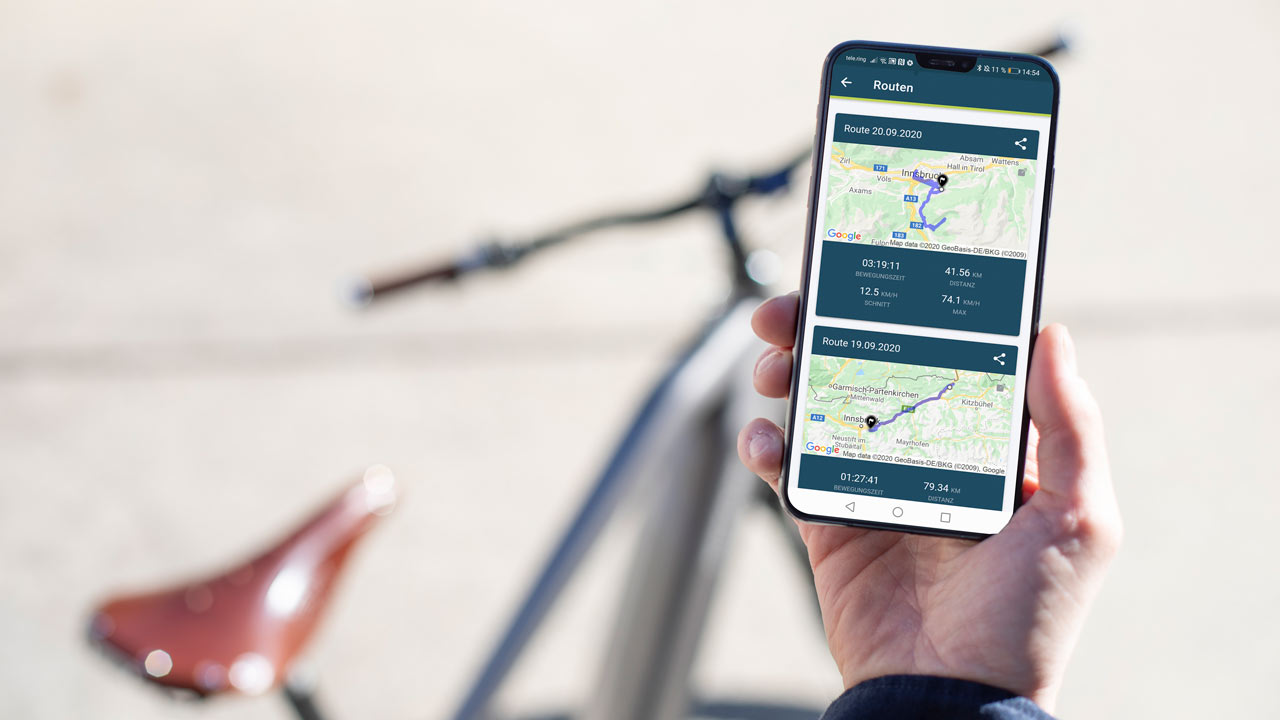
With a GPS tracker and fleet management software, you can query the positions of all vehicles in a fleet anywhere, anytime.
Did you know? Real-time location tracking is also called active GPS tracking. Real-time tracking applications are essential for security purposes, especially for vehicles such as cars or bicycles, when theft attempts occur.
Info: If you would like to find out in detail how GPS tracking works and how the use and function of a GPS tracker in the mobility sector is designed, then go ahead and read our article “GPS Tracker: How GPS Tracking Works!”
Communication between GPS fleet tracking devices/data logger and server/cloud
As already mentioned, GPS trackers and data loggers communicate with a server/cloud via the mobile network. The right transmission technology plays an important role here. Even minor deviations and delays in GPS determination or incomplete data can make a big difference in the efficiency and profit margin of a fleet operator. Not only for booking purposes, but also in case of theft, seamless network coverage is essential to locate e-bike thieves and recover bikes. GPS vehicle tracking should, therefore, be based on a reliable transmission technology that is also specifically suitable for mobility applications. In the specific case of e-bikes, these are 2G technology, LTE-M or narrowband IoT.
Info: In our topic special “GPS technologies” you can find detailed information on the individual transmission technologies 2G, LTE-M and Narrowband-IoT and learn more about IoT and connected e-bikes:
PowUnity BikeTrax GPS Tracker and Data Logger
PowUnity offers specific hardware for fleet tracking solutions for e-bike fleet operators. Depending on the requirements and the aim of using a fleet tracking solution, the hardware consists of:
- (only) the GPS tracker; this allows GPS tracking (position determination) and an e-bike anti-theft protection at the same time.
- a data logger extended to the GPS tracker, with which CAN bus data of the e-bike can be read out. The data logger is developed individually with fleet managers according to their needs and fleet tracking aims.
GPS fleet tracking software
If not only one e-bike, but an entire fleet is to be monitored and organised city-, region- or country-wide via GPS, then a stable and reliable software is essential for fleet managers. A digital gps fleet software then becomes the heart of every operator, so that existing and new customers can use their services with satisfaction and the administration works smoothly. However, as with everything, there is no one software “template” that every fleet operator can use to successfully “digitalise” their system.
As a fleet operator, you should therefore ask yourself the following questions in advance:
What do I want to achieve with my fleet tracking initiative?
Do I want an effective anti-theft protection for my e-bikes? Do I want to manage my bookings more efficiently and clearly? Or do I need GPS tracking to offer a new kind of mobility concept?
Do I already work with an existing software for my vehicle fleet?
Do I want to integrate the data from the GPS tracker and data logger in my software? Or is there no existing system for my fleet and I am starting my new business from scratch?
PowUnity Fleet Management Platform
PowUnity offers fleet managers not only GPS tracking software in the form of an app, but also its own fleet platform for monitoring e-bike fleets.
In the map view that the platform contains, the fleet operator can see the location of each e-bike at all times. If an e-bike is stationary, the user sees the e-bike in red in the list view; if it is being moved, the colour switches to green. It is also possible to read out and export the following movement data from the platform:
- Position in real time
- Start and end time
- Speed (real-time, average, maximum speed)
- Journey and standstill time spent
- Odometer
PowUnity also offers an application programming interface (API) for operators, via which the fleet tracking system can be integrated into their own booking platform or mobile app in just a few steps.
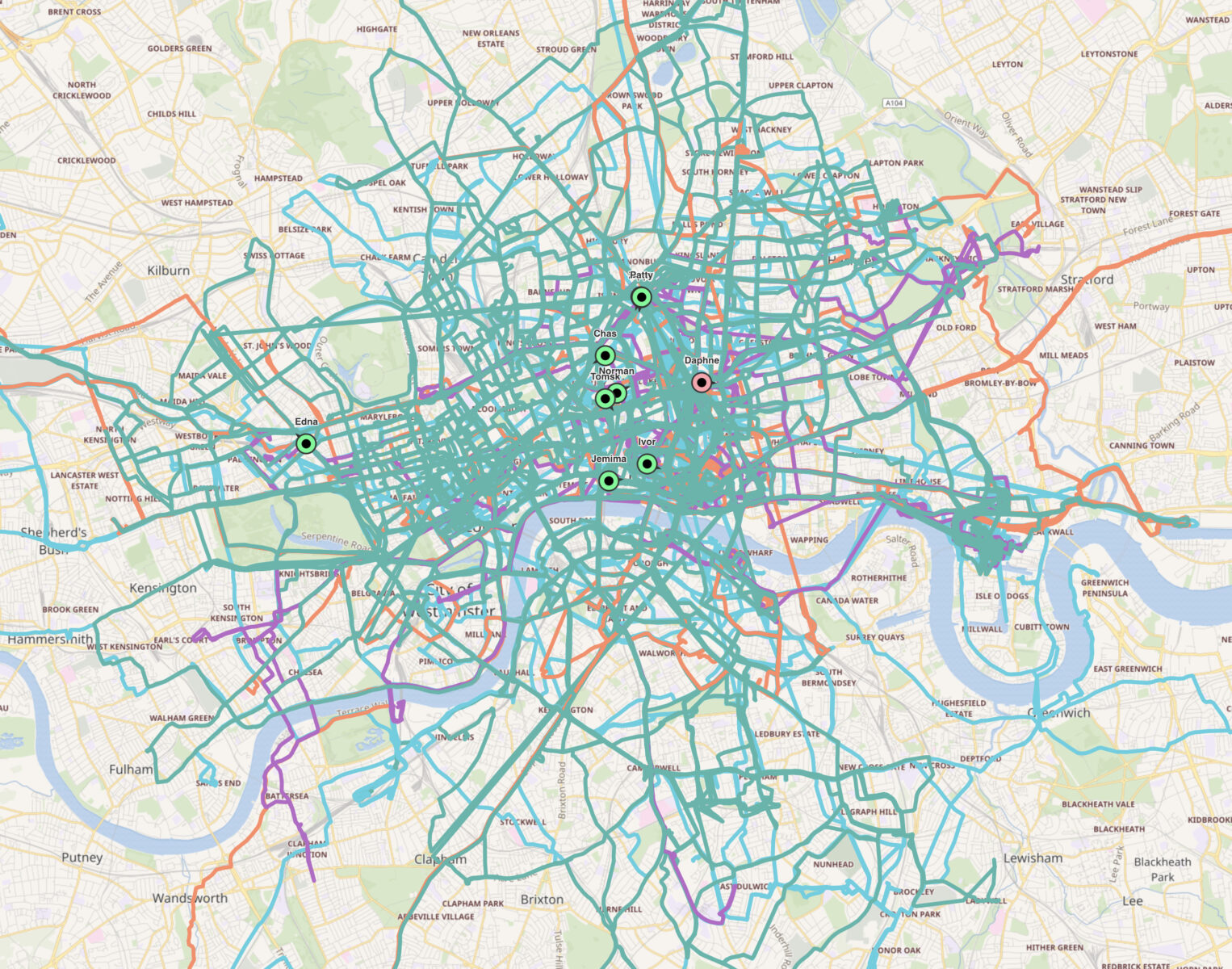
Specific use cases of e-bike gps fleet tracking systems
Anti-theft protection
Efficient theft protection is in high demand, especially for e-bike rental companies for which vehicle security is highly important. The Sanvit e-bike rental company in South Tyrol, for example, is a long-standing PowUnity customer. They rent out e-bikes to municipalities or private tourists who want to go for an e-bike ride spontaneously. If a bike in the e-bike fleet is moved or stolen without permission, it is possible to receive alerts and the current location can be viewed at any time using GPS. In the summer of 2021, the employees even caught a thief themselves using our GPS tracking: “It was a chase like in a movie, I was able to watch everything live via the PowUnity app,” Anna from Sanvit told us.
Booking management
If not only one e-bike, but a whole fleet size is to be monitored and organised via GPS across a city or country, then the entire booking process can be managed via digital gps fleet tracking system. For our partner iBike Box, the fleet software helps to organise hundreds of e-bikes in Austria and Mallorca, which the company provides for hotels and cities. Billing with the third-party providers happens automatically via the operating system. In addition, with the help of the GPS trackers, bogus bookings or thefts are immediately detected. Markus, Head of Service at iBike Box, told us personally about an extraordinary theft experience at iBike Box:
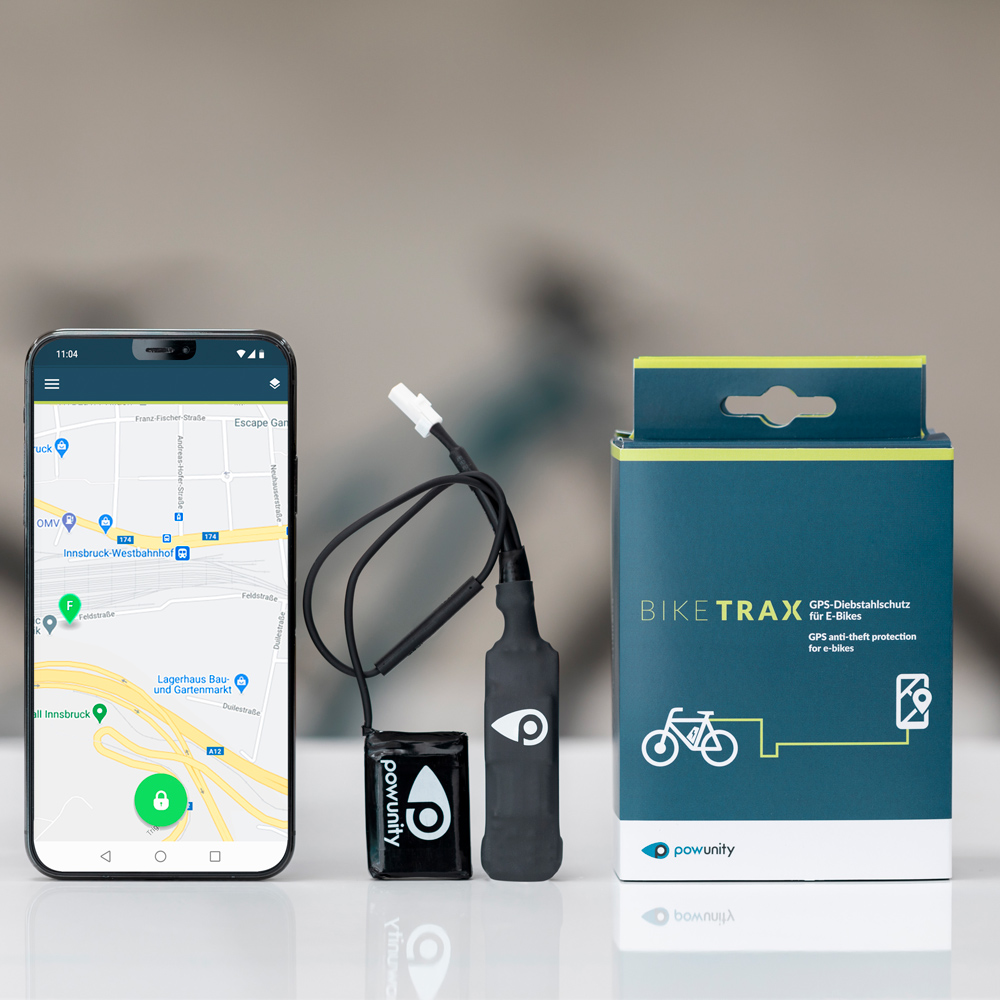
Do you want a route tracking solution that you can integrate into your own booking software?
New mobility concepts
Mobility as a Service is digital management of a vehicle tracking par excellence. In a nutshell, Mobility as a Service (MaaS) means that various mobility services (e-bikes, e-scooters, etc.) are bundled into one platform. For instance, PowUnity’s partner Cargoroo, specialises in e-cargo bike sharing and offers this service in many Dutch cities:
- Customers download an app,
- see the specific locations of available means of transport (free-floating system),
- book the means of transport of their choice via this platform,
- unlock it themselves via the app
- and at the same time pay via smartphone in the same application.
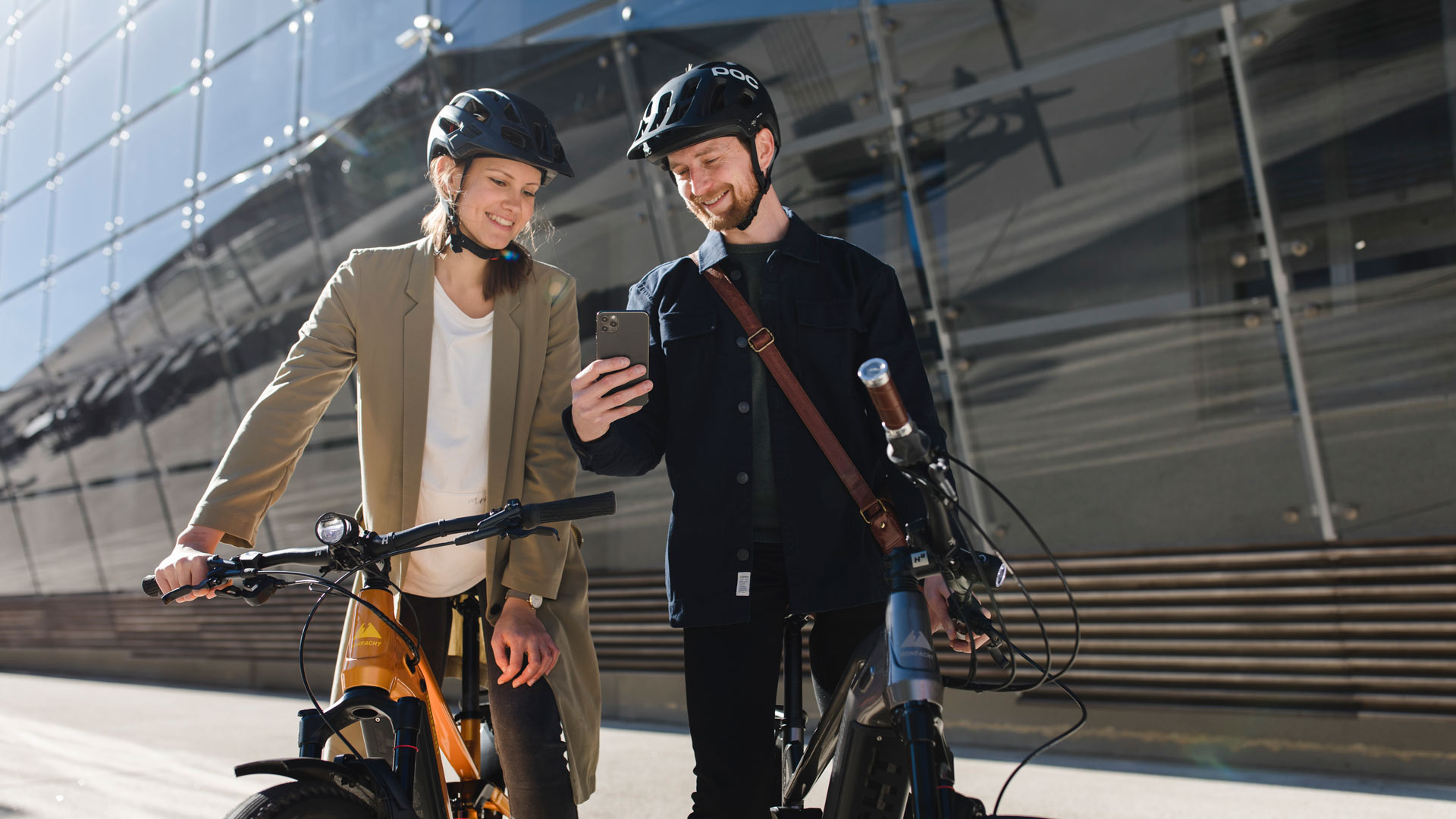
Info: You can read more about Mobility as a Service concepts and other providers in our article “Mobility as a Service: This is how the future of mobility looks like”.
Tracking of parcel deliveries
Digital vehicle tracking is also the solution for efficient deliveries in the CEP (courier, express and parcel service) sector and at the post office. In fact, there are currently more e-bike and e-cargo bike fleets in the CEP sector than ever, not only because of the climate and environmental discourse. With digital gps fleet tracking, CEP service providers can track where their cyclists are in real time, adjust route planning in a time-optimised manner, and at the same time manage thousands of deliveries.
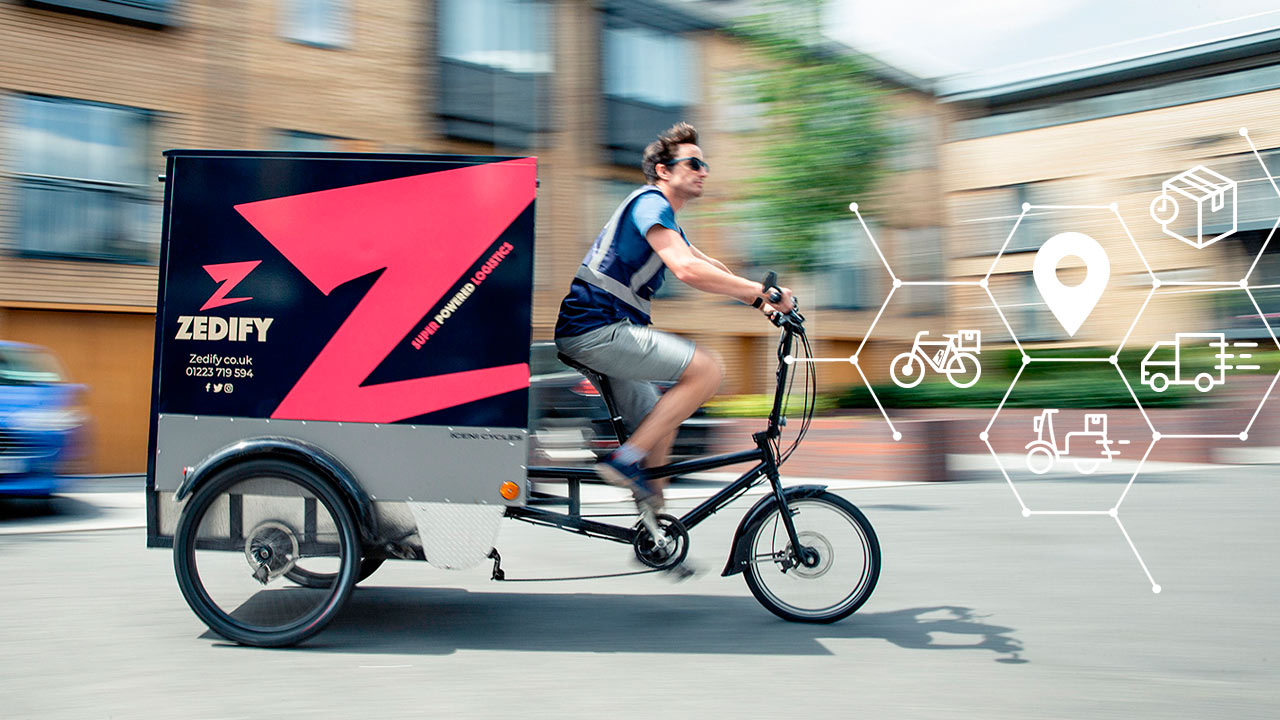
You can read more about how CEP services use GPS tracking solutions today and what opportunities digital gps fleet tracking creates for them in our article “CEP services and digitalisation – opportunities and challenges”.
GPS vehicle tracking and fleet management system for e-bikes – what to watch out for when making your choice
E-bike rental, parcel delivery or e-bike sharing are just a few use cases that are organised by means of digital gps fleet tracking. Depending on the area in which a fleet operator provides e-bikes or another fleet vehicle, certain points need to be considered beforehand when choosing suitable vehicle tracking systems:
- E-bikes for what? What do I want to achieve with the e-bike fleet system?
- GPS tracker with or without data logger? Do I only need the position data in real time or also other data, such as the e-bike battery charge level?
- Which GPS tracker? How suitable is the offered hardware for my mobility solution?
- What is the transmission interval? How often is the GPS position updated?
- What is the size of the GPS hardware? Can I mount it inside an e-bike to protect it against theft?
- Which hardware interface? How easy is it to connect the hardware with a bike?
- How durable is the hardware? Is it dust- and water-resistant?
- What does the accompanying software offer? Does it meet my requirements? Can I link it to my existing operating system via API?
- How high is the server’s reliability? Hardware and software is one thing, but only half the battle without server stability.
- How high are my running costs? What is the cost of data transmission? This amount as well as the billing modality are relevant parameters that should be considered when implementing a GPS fleet tracking project.
The PowUnity GPS fleet management system for e-bikes
PowUnity develops hardware and software solutions for fleet operators that are individually tailored to a particular company. Based on the above questions, the PowUnity fleet offering can be summarised as follows:
- With the PowUnity fleet platform, any number of e-bikes can be monitored.
- BikeTrax has a similar size to a lighter and can also be connected to the e-bike’s CAN bus system if required.
- With BikeTrax, PowUnity offers GPS tracking hardware that is based on either the 2G or LTE-M standard.
- BikeTrax transmits the GPS data of e-bikes in real time at 10-second intervals to a server/cloud. Special attention is paid to the stability of our server.
- The tracker is connected to the e-bike via a predefined interface.
- The hardware is dust- and water-resistant and is mounted inside and not on the e-bike.
- Via the API interface, the PowUnity fleet management system or the tracker/data logger can be easily integrated into existing software.
- The PowUnity fleet management system offers day-by-day billing. For position determination (GPS tracking), the costs for connectivity are EUR 0.10 per day per active BikeTrax GPS tracker. If a tracking device is deactivated, this amount does not apply. The tracker can be re-activated at any time by adding it to the platform.

Do you need an intelligent management system for your e-bike fleet and want to avoid high development costs?
Fleet vehicles tracking outside the e-bike sector
PowUnity is a pioneer in the field of e-bike digitisation and e-bike fleet management. We are passionate about the e-bike industry and the opportunities that arise and will arise with connected e-bikes.
Due to intense demand, we have expanded our GPS fleet tracking solution to other industries and also use our GPS tracking device for e-scooters, motorbikes and construction machinery.
Fleet management systems for transport company fleets are often associated with very high running costs, not only because the willingness to pay in the B2B sector is much higher than in the B2C sector. In the automotive industry, it is also not uncommon to develop a highly progressive vehicle tracking solution, which is then only partly needed or used.
If you are looking for a software solution for a specific use case of your vehicles outside the e-bike sector and do not want to pay more for performance than you actually need, then contact us! If our system meets the requirements profile for your fleet, we are prepared to look outside the e-bike box to support you.
Share article!

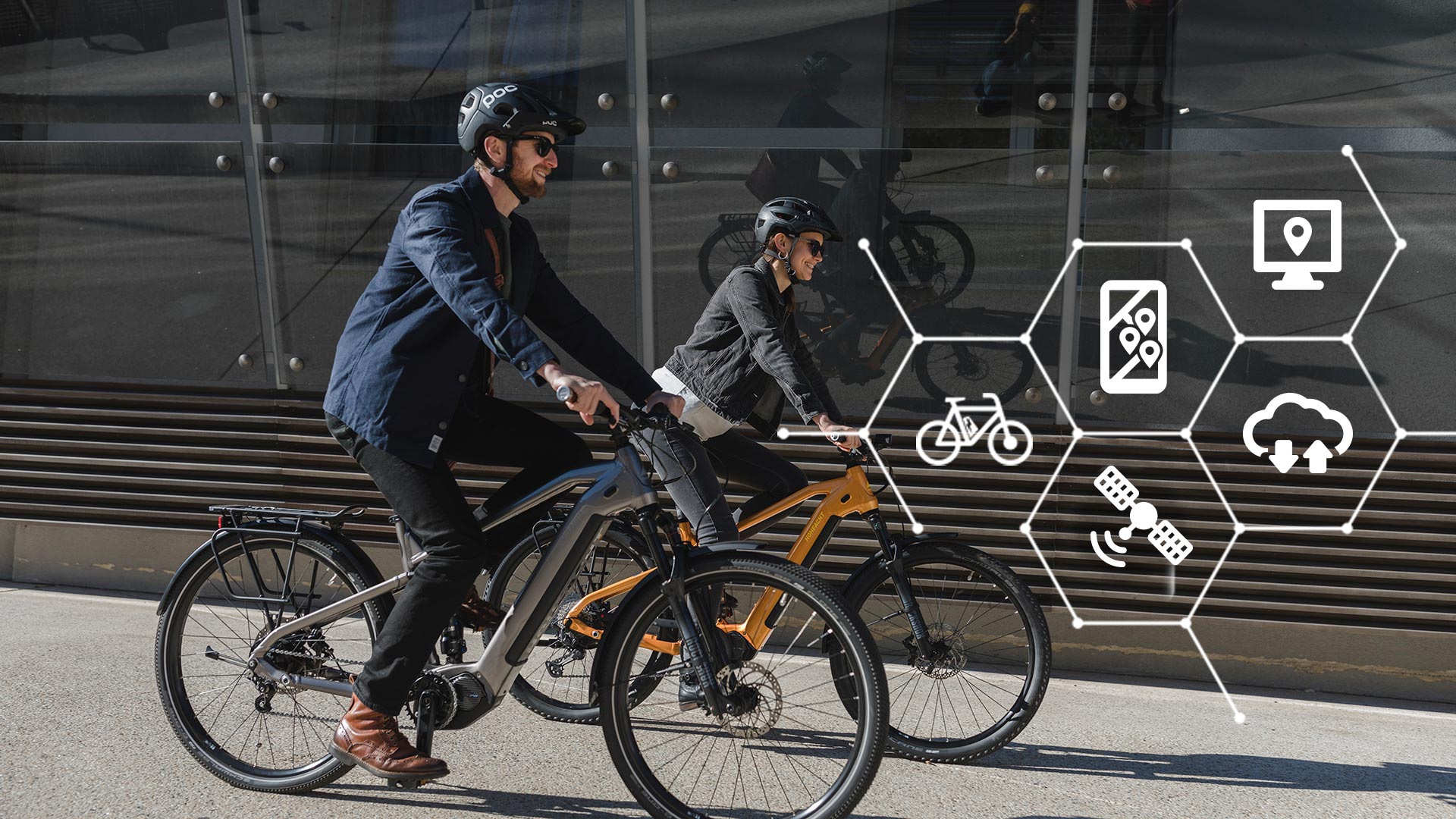



 Deutsch
Deutsch